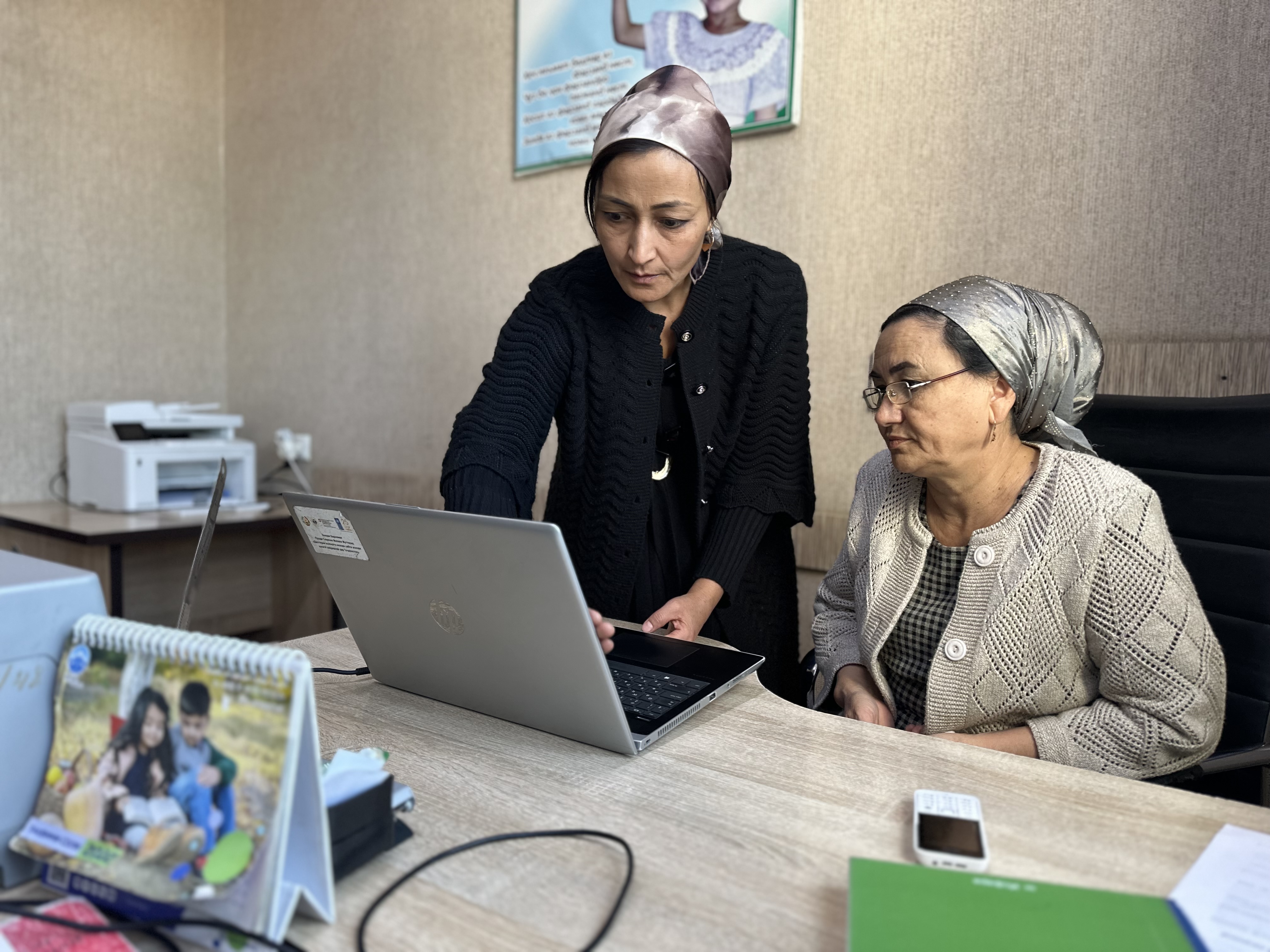Exiting the maze: Civil registry system reform to bring public services closer to people in Tajikistan
November 14, 2023

Two female employees at the Civil Registry Centre in Isfara, Tajikistan, input data into an online platform. UNDP, with funding from Switzerland, provided the centre with laptops and training.
Have you ever found yourself trapped in a bureaucratic maze, bouncing from one government office to another just to complete a simple task, such as registering your child or marriage?
Now imagine a world where accessing any public service is quick and hassle-free, without the need to navigate a labyrinth of offices. This is the vision that the UNDP is helping the Government bring to life in Tajikistan through its Civil Registry System Reform Initiative, which is funded by the European Union and Switzerland.
Interoperability is the game-changing factor in this vision. It's the concept of having all your essential documents, such as birth certificates and marriage certificates, stored in a way that any authorized government agency can access them.
For instance, when you register your child, the Ministry of Education receives a notification, enabling them to prepare for your child's future education needs. Likewise, the Ministry of Health and Social Protection is alerted so that it can administer the necessary vaccinations. This system, backed by enhanced data accuracy and quality, could empower the government to deliver better public services and plan more effectively.
At present, Tajikistan's information systems and databases have to grapple with incomplete data and outdated data storage, sharing, and access mechanisms. Fragmented systems lead to errors, delays, and wasted effort.
Since 2019, the Ministry of Justice has been utilizing the Civil Registration Offices Information System v.2 (CROISv2) for data entry and certificate issuance. However, a UNDP assessment in February 2023 uncovered a pressing need for a more agile and interoperable system. To align with the National Civil Registry Reform Programme and National Development Strategy, UNDP is supporting the Government of Tajikistan to develop a centralized civil registration portal, ensuring it integrates seamlessly with a range of government entities. This government-owned portal will serve as a one-stop access point for all civil registry data, and is designed to be interoperable with other government entities – including the interior, foreign affairs, and health and social protection ministries, as well as the Agency for Statistics and the Tax Committee. It will enable the efficient management of various social benefits, including pensions, child support, and more.
At an international conference in September 2023 supported by UNDP, titled "Digitization of Public Services in the Republic of Tajikistan: Inter-agency Integration and Interoperability of Data Systems," the Minister of Justice and the First Deputy Minister of Health and Social Protection issued a joint declaration. In this declaration, they pledged to develop a new Civil Registration Portal and enhance inter-agency collaboration for public services.
Muzzafar Ashuriyon, the Minister of Justice of Tajikistan, expressed his commitment to the reform, saying: "By establishing inter-agency integration and interoperability of information systems, we’re striving to improve the efficiency, transparency, and quality of government services, promoting digital transformation that will benefit all citizens of Tajikistan."
The ministry’s proactive steps reaffirm their pledge. At the minister’s direction, a dynamic technical working group was formed in August 2023, bringing together legal experts, civil registry staff and ICT specialists to lead the centralized civil registry portal project. They have already crafted a comprehensive roadmap through multiple collaborative sessions. UNDP provided State Unitary Enterprise Qonuniyat's ICT team with cybersecurity, programming, and technical support training so they could manage the new portal, ensuring the long-term sustainability of the service.
Earlier this year, UNDP facilitated two study trips for the Government of Tajikistan to get insights from Uzbekistan's experience in implementing data integration initiatives. In August 2023, Justice Minister Ashurioyon led a high-level visit to Uzbekistan, and in October 2023, a team of technical experts from Tajikistan embarked on a study mission. They examined various aspects of Uzbekistan's institutional structures, legislative frameworks, leadership, and civil registration management. The goal was to learn best practices and apply them domestically while prioritizing gender-inclusive aspects and the perspectives of women in the reform. Interoperability is the cornerstone of a modern and efficient civil registry system globally. Tajikistan is embarking on this reform journey to draw public services closer to its people, enhance security, and bolster planning capabilities.
“Access to accurate and reliable data empowers the government to make informed policy decisions, conduct effective planning, and allocate resources adequately,” says Lenni Montiel, UNDP Resident Representative in Tajikistan.
“The reform will enhance the efficiency of public service delivery, reduce costs, ensure data accuracy, improve data quality, bolster security and transparency, and increase the accountability of the Government to its citizens.”

 Locations
Locations